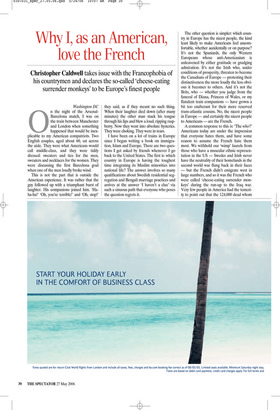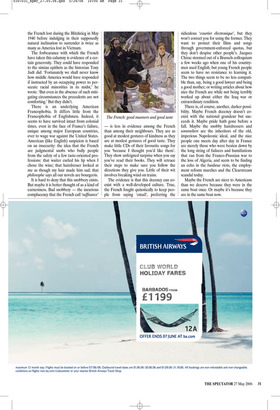Why I, as an American, love the French
Christopher Caldwell takes issue with the Francophobia of his countrymen and declares the so-called ‘cheese-eating surrender monkeys’ to be Europe’s finest people
Washington DC
On the night of the ArsenalBarcelona match, I was on the train between Manchester and London when something happened that would be inexplicable to my American compatriots. Two English couples, aged about 60, sat across the aisle. They were what Americans would call middle-class, and they were tidily dressed: sweaters and ties for the men, sweaters and necklaces for the women. They were discussing the first Barcelona goal when one of the men loudly broke wind.
This is not the part that is outside the American experience. It was rather that the guy followed up with a triumphant burst of laughter. His companions joined him. ‘Haha-ha!’ ‘Oh, you’re terrible!’ and ‘Oh, stop!’ they said, as if they meant no such thing. When their laughter died down (after many minutes) the other man stuck his tongue through his lips and blew a loud, ripping raspberry. Now they went into absolute hysterics. They were choking. They were in tears.
I have been on a lot of trains in Europe since I began writing a book on immigration, Islam and Europe. There are two questions I get asked by friends whenever I go back to the United States. The first is: which country in Europe is having the toughest time integrating its Muslim minorities into national life? The answer involves so many qualifications about Swedish residential segregation and Bengali marriage practices and arrives at the answer ‘I haven’t a clue’ via such a sinuous path that everyone who poses the question regrets it. The other question is simpler: which country in Europe has the nicest people, the kind least likely to make Americans feel uncomfortable, whether accidentally or on purpose? It’s not the Spaniards, the only Western Europeans whose anti-Americanism is unleavened by either gratitude or grudging admiration. It’s not the Irish who, under conditions of prosperity, threaten to become the Canadians of Europe — protesting their distinctiveness the more loudly the less obvious it becomes to others. And it’s not the Brits, who — whether you judge from the funeral of Diana, Princess of Wales, or my flatulent train companions — have grown a bit too exuberant for their more reserved trans-atlantic cousins. No, the nicest people in Europe — and certainly the nicest people to Americans — are the French.
A common response to this is: ‘The who?’ Americans today are under the impression that everyone hates them, and have some reason to assume the French hate them most. We withhold our ‘wimp’ laurels from those who have a muscular ethnic representation in the US — Swedes and Irish never have the neutrality of their homelands in the second world war flung back in their faces — but the French didn’t emigrate west in large numbers, and so it was the French who were called ‘cheese-eating surrender monkeys’ during the run-up to the Iraq war. Very few people in America had the temerity to point out that the 124,000 dead whom the French lost during the Blitzkrieg in May 1940 before indulging in their supposedly natural inclination to surrender is twice as many as America lost in Vietnam.
The forbearance with which the French have taken this calumny is evidence of a certain generosity. They could have responded to the simian epithets as the historian Tony Judt did: ‘Fortunately we shall never know how middle America would have responded if instructed by an occupying power to persecute racial minorities in its midst,’ he wrote. ‘But even in the absence of such mitigating circumstances the precedents are not comforting.’ But they didn’t.
There is an underlying American Francophobia. It differs little from the Francophobia of Englishmen. Indeed, it seems to have survived intact from colonial times, even in the face of France’s failure, unique among major European countries, ever to wage war against the United States. American (like English) suspicion is based on an insecurity: the idea that the French are judgmental snobs who bully people from the safety of a few taste-oriented professions: that waiter curled his lip when I chose the wine; that hairdresser looked at me as though my hair made him sad; that philosophe says all our novels are bourgeois.
It is hard to deny that this snobbery exists. But maybe it is better thought of as a kind of earnestness. Bad snobbery — the incurious complacency that the French call ‘suffisance’ — is less in evidence among the French than among their neighbours. They are as good at modest gestures of kindness as they are at modest gestures of good taste. They make little CDs of their favourite songs for you ‘because I thought you’d like them’. They show unfeigned surprise when you say you’ve read their books. They will retrace their steps to make sure you follow the directions they give you. Little of their wit involves breaking wind on trains.
The evidence is that this decency can coexist with a well-developed culture. True, the French fought quixotically to keep people from saying ‘email’, preferring the ridiculous ‘courrier électronique’, but they won’t correct you for using the former. They want to protect their films and songs through government-enforced quotas, but they don’t despise other people’s. Jacques Chirac stormed out of a Brussels colloquium a few weeks ago when one of his countrymen used English, but young French people seem to have no resistance to learning it. The two things seem to be no less compatible than, say, being a good lawyer and being a good mother; or writing articles about how nice the French are while not being terribly worked up about either the Iraq war or extraordinary rendition.
There is, of course, another, darker possibility. Maybe French decency doesn’t coexist with the national grandeur but succeeds it. Maybe pride hath gone before a fall. Maybe the snobby hairdressers and sommeliers are the inheritors of the old, imperious Napoleonic ideal, and the nice people one meets day after day in France are merely those who were beaten down by the long string of failures and humiliations that ran from the Franco–Prussian war to the loss of Algeria, and seem to be finding an echo in the banlieue riots, the employment reform marches and the Clearstream scandal today.
Maybe the French are nicer to Americans than we deserve because they were in the same boat once. Or maybe it’s because they are in the same boat now.











































































































 Previous page
Previous page